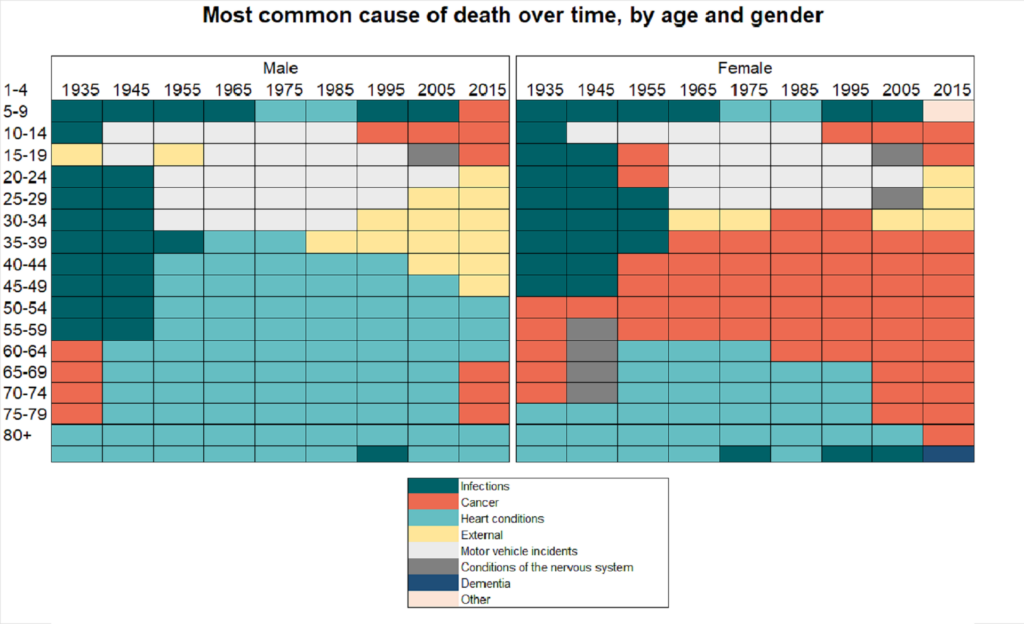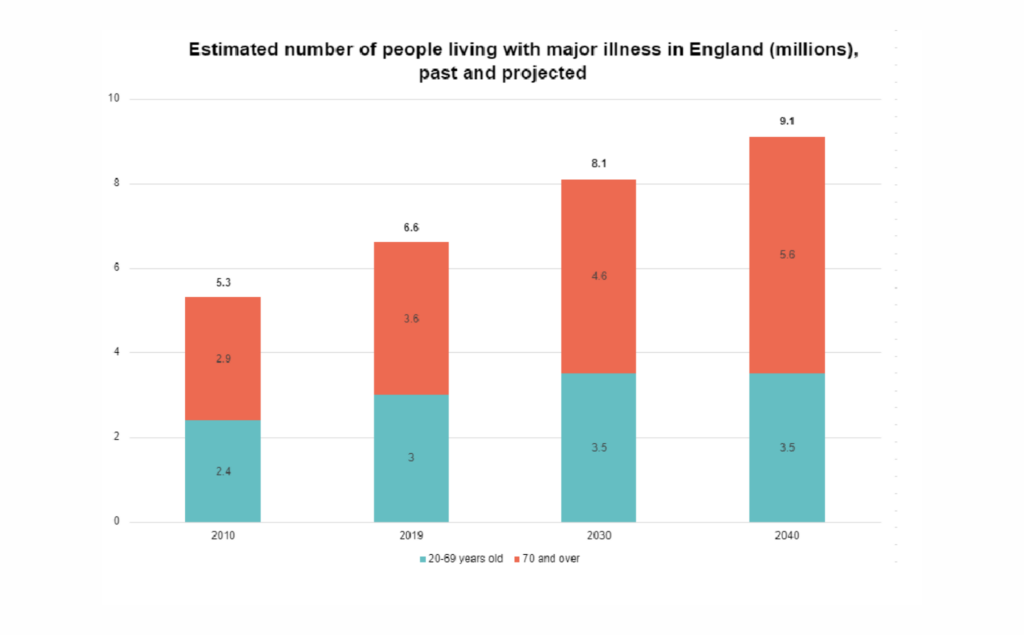Sign up to our newsletter Subscribe
Analysing Global Immunisation Expenditure

Sign up to our newsletter Subscribe


OHE has been producing reports since 1962 which give insights into issues facing the NHS in the 75 years since it was created. The first part of this blog series, explored the successes of the NHS over the last 75…

OHE has been producing reports since 1962 which give insights into issues facing the NHS in the 75 years since it was created. The first part of this blog series, explored the successes of the NHS over the last 75 years in key disease areas. This second part, considers how the demand for healthcare services has evolved, and how this has shaped the role of the NHS.
Two factors are explored within this: (1) changing disease patterns and (2) changing attitudes towards health.
Changing disease patterns
In the early years of the NHS, the health system was preoccupied with tackling infectious diseases and life-threatening conditions such as tuberculosis, pneumonia, diphtheria and appendicitis (Office of Health Economics, 1964). However, quickly, the development of vaccines, antibiotics, and improved living conditions greatly reduced the morbidity and mortality associated with many of these diseases (Office of Health Economics, 1974). As the life expectancy of the population increased, healthcare services shifted from urgent treatment of life-threatening illnesses to management of chronic illness associated with an ageing population. The figure below illustrates the changing patterns of disease, showing the top cause of death by gender and age group over time. Today, the leading cause of death for males is heart disease (13.3% of all male deaths), while the leading cause of death for females is dementia (15% of all female deaths) (Office for National Statistics, 2023).

Source: (Office for National Statistics, 2017)
Chronic conditions are now the leading cause of mortality worldwide (World Health Organization, 2022). Chronic conditions (such as cancer, heart disease and dementia) require different types of care across healthcare sectors and services. A 1974 OHE report outlined the need for improvements to definitions and strengthening the role of primary healthcare services, as GPs act as a coordinator of healthcare across these different services (Office of Health Economics, 1974). Today, the need for more integrated and coordinated care has become increasingly important given the complex disease challenges of the population. The NHS is looking to develop models of care which reflect this, focusing on increasing integration of services (NHS, 2019)
Changing attitudes towards health
The last 75 years have also seen changing attitudes and awareness around health, and the healthcare that should be provided by the NHS. Early OHE reports document a shift of general public opinion that the NHS should be concerned with the treatment of critical conditions, to considering “minor illness”, in particular for those in older age, where conditions such as deafness and blindness had previously been considered a natural consequence of ageing (Office of Health Economics, 1971).
A greater understanding of certain disease areas, in particular mental health, has influenced the types of services provided by the NHS. As people become more aware and accepting of mental health problems, they become more willing to seek appropriate treatment. A Time To Change survey on attitudes towards mental health showed a marked increase in respondents agreeing to statements between 2008 and 2014 such as ‘‘We need to adopt a far more tolerant attitude toward people with mental illness in our society” (83% to 91%) and “We have a responsibility to provide the best possible care for people with mental illness” (89% to 94%) (Mind, 2015).
While NHS services have adapted to provide for changing healthcare demands, there remain issues over the best way to organise and deliver this care, and who should provide it. For example, patients with dementia, the number one cause of death for women, are treated as part of the social care system, and do not have the same access to support services as with other diseases such as cancer or diabetes. Therefore, patients face large out-of-pocket costs to pay for their care, with research in the UK estimating that people with dementia spend £100,000 on average for the care they need (Alzheimer’s Society, 2018).
Looking ahead
The role of the NHS will continue to develop as demographics, treatments, technology and attitudes continue to change. For example, a recent report by The Health Foundation estimates that 9.1 million people, 1 in 5 of the adult population, are predicted to be living with major illness by 2040 (The Health Foundation, 2023). Anticipating how these changes will impact the healthcare demands of the population will be vital for policymakers to deliver adequate services.

The NHS is under considerable strain and has struggled to provide services to meet changing healthcare demands. This has only worsened due to the disruption to services and large backlog of patients waiting for care as a result of the covid-19 pandemic. Increased knowledge on how changing patterns of disease and attitudes towards health will impact demand for healthcare is required, as the NHS continues to evolve to meet the changing and growing healthcare needs of the UK population.
References:
Alzheimer’s Society, 2018. Dementia – the true cost: Fixing the care crisis. [online] Available at: https://www.alzheimers.org.uk/about-us/policy-and-influencing/dementia-true-cost-fixing-care-crisis [Accessed 11 Aug. 2023].
Mind, 2015. Attitudes to mental illness 2014 research report: prepared for Time to Change. [online] Mind. Available at: https://www.bl.uk/collection-items/attitudes-to-mental-illness-2014-research-report [Accessed 14 Aug. 2023].
NHS, 2019. The NHS Long Term Plan. [online] Available at: https://www.longtermplan.nhs.uk/wp-content/uploads/2019/08/nhs-long-term-plan-version-1.2.pdf [Accessed 16 Jun. 2023].
Office for National Statistics, 2017. Causes of death over 100 years. [online] Available at: https://www.ons.gov.uk/peoplepopulationandcommunity/birthsdeathsandmarriages/deaths/articles/causesofdeathover100years/2017-09-18 [Accessed 10 Aug. 2023].
Office for National Statistics, 2023. Death registration summary statistics, England and Wales. [online] Available at: https://www.ons.gov.uk/peoplepopulationandcommunity/birthsdeathsandmarriages/deaths/articles/deathregistrationsummarystatisticsenglandandwales/2022 [Accessed 10 Aug. 2023].
Office of Health Economics, 1964. New Frontiers in Health. Series on Health. [online] Available at: https://ideas.repec.org//p/ohe/shealt/000111.html [Accessed 3 Jul. 2023].
Office of Health Economics, 1971. Prospects in Health. Series on Health. [online] Available at: https://ideas.repec.org//p/ohe/shealt/000205.html [Accessed 3 Jul. 2023].
Office of Health Economics, 1974. Work of Primary Medical Care. Series on Health. [online] Available at: https://ideas.repec.org//p/ohe/shealt/000250.html [Accessed 3 Jul. 2023].
The Health Foundation, 2023. Health in 2040: projected patterns of illness in England. [online] Available at: https://www.health.org.uk/publications/health-in-2040 [Accessed 14 Aug. 2023].
World Health Organization, 2022. Noncommunicable diseases. [online] Available at: https://www.who.int/news-room/fact-sheets/detail/noncommunicable-diseases [Accessed 21 Jun. 2023].
An error has occurred, please try again later.
This website uses cookies so that we can provide you with the best user experience possible. Cookie information is stored in your browser and performs functions such as recognising you when you return to our website and helping our team to understand which sections of the website you find most interesting and useful.
Strictly Necessary Cookie should be enabled at all times so that we can save your preferences for cookie settings.
If you disable this cookie, we will not be able to save your preferences. This means that every time you visit this website you will need to enable or disable cookies again.
This website uses Google Analytics to collect anonymous information such as the number of visitors to the site, and the most popular pages.
Keeping this cookie enabled helps us to improve our website.
Please enable Strictly Necessary Cookies first so that we can save your preferences!



